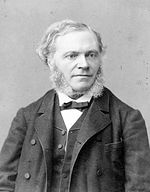César Franck, Date of Birth, Place of Birth, Date of Death
TweetCésar Franck
Belgian-French composer, organist and music teacherAbout César Franck
- César-Auguste-Jean-Guillaume-Hubert Franck (10 December 1822 – 8 November 1890) was a composer, pianist, organist, and music teacher who worked in Paris during his adult life. He was born at Liège, in what is now Belgium (though at the time of his birth it was part of the United Kingdom of the Netherlands).
- He gave his first concerts there in 1834 and studied privately in Paris from 1835, where his teachers included Anton Reicha.
- After a brief return to Belgium, and a disastrous reception for an early oratorio Ruth, he moved to Paris, where he married and embarked on a career as teacher and organist.
- He gained a reputation as a formidable musical improviser, and travelled widely within France to demonstrate new instruments built by Aristide Cavaillé-Coll. In 1858, he became organist at the Basilica of St.
- Clotilde, Paris, a position he retained for the rest of his life.
- He became professor at the Paris Conservatoire in 1872; he took French nationality, a requirement of the appointment.
- His pupils included Vincent d'Indy, Ernest Chausson, Louis Vierne, Charles Tournemire, Guillaume Lekeu and Henri Duparc.
- After acquiring the professorship, Franck wrote several pieces that have entered the standard classical repertoire, including symphonic, chamber, and keyboard works.
Read more at Wikipedia
See Also
- Famous People's Birthdays on 10 December, Belgium
- Famous People's Birthdays in December, Belgium
- Famous People's Birthdays on 10 December, France
- Famous People's Birthdays in December, France
- Famous composer's Birthdays on 10 December, Belgium
- Famous composer's Birthdays in December, Belgium
- Famous pianist's Birthdays on 10 December, Belgium
- Famous pianist's Birthdays in December, Belgium
- Famous organist's Birthdays on 10 December, Belgium
- Famous organist's Birthdays in December, Belgium
- Famous music pedagogue's Birthdays on 10 December, Belgium
- Famous music pedagogue's Birthdays in December, Belgium
- Famous composer's Birthdays on 10 December, France
- Famous composer's Birthdays in December, France
- Famous pianist's Birthdays on 10 December, France
- Famous pianist's Birthdays in December, France
- Famous organist's Birthdays on 10 December, France
- Famous organist's Birthdays in December, France


 Date of Birth:
Date of Birth:  Place of Birth: Liège, Wallonia, Belgium
Place of Birth: Liège, Wallonia, Belgium
